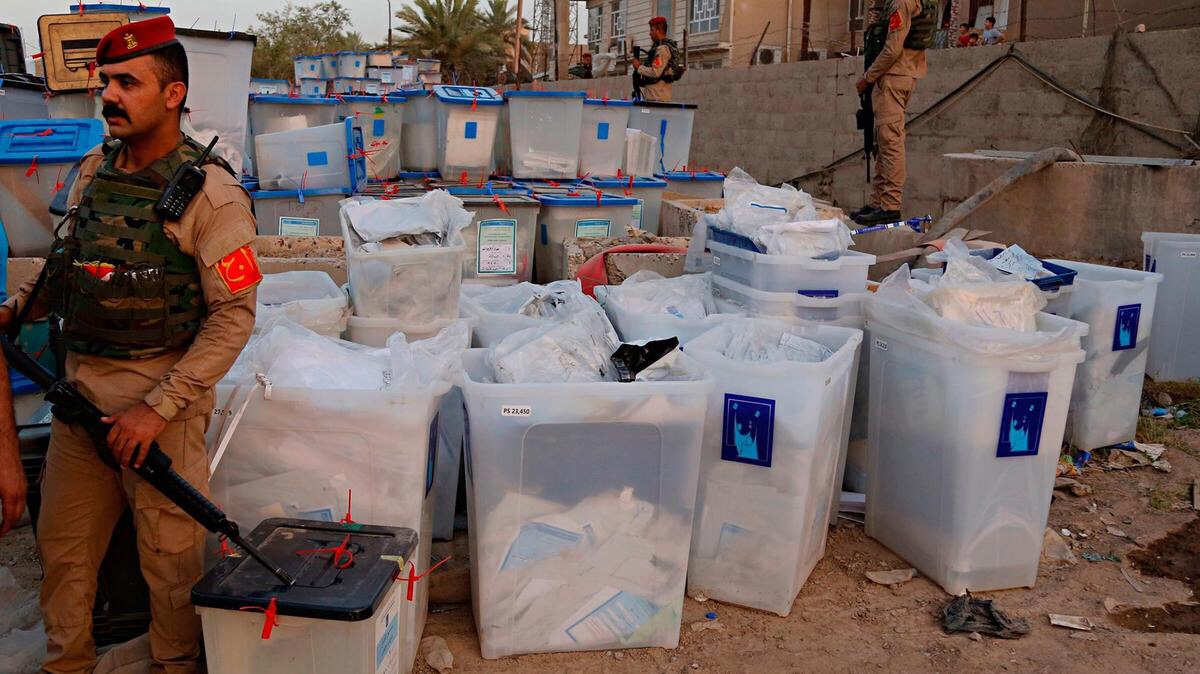
Iraqi security forces guard ballot boxes after a fire that broke out at Baghdad's largest ballot box storage site, where ballots from Iraq's May parliamentary elections are stored. AP
Moqtada Al Sadr retains victory in Iraq election recount
Al Sadr's bloc retaining its tally of 54 seats in recount, while second-placed group of Iran-backed Shiite militia leaders gain a seat
Mina Al Droubi
Populist Shiite cleric Moqtada Al Sadr retained his lead in Iraq's May parliamentary election, results of a nationwide recount of votes showed on Friday.
The recount, released by Iraq's Independent High Election Commission (IHEC), positions him to play a central role in forming the country's next government.
The recount did not alter the initial results significantly, with Mr Al Sadr's bloc retaining its tally of 54 seats.
A group of Iran-backed Shiite militia leaders remained second, but gained an extra seat that pushed them to 48, with incumbent Prime Minister Haider Al Abadi's bloc remains in third place with 42 seats.
The results announced on Friday can still be contested by parties and have to be ratified by Iraq's Supreme Federal Court in order to become final.
Once ratified, a 90-day timeline for the formation of government begins. Legislators must first elect a speaker, then the president, and finally the prime minister and cabinet.
Mr Al Abadi, who is seeking a second term in office, is heading a fragile caretaker government until a new one is formed.
Iraq began the manual recount of votes on July 3 in an attempt to end the country's political stalemate resulting from inconclusive elections in May. The process ended on August 6.
Here is how the first recount of a vote in Iraq's history unfolded.
A peaceful election
On May 12 Iraqi voted in the first parliamentary elections since the toppling of ISIS, in a largely peaceful election.
Even on the day of the poll, Kirkuk's minority groups claimed voting violations including glitches in electronic voting machines, which had been used for the first time to reduce fraud.
As the results of the elections were announced it became clear Moqtada Al Sadr's party, Sairoon, a bloc primarily consisting of the Sadrist Movement, would be the largest parliamentary party, although they would not have a majority of seats.
The next step for Mr Al Sadr was to form a parliamentary party and to pick a prime minister.

An Iraqi woman shows her ink-stained index finger before a national flag after having cast her vote in the parliamentary election, in the capital Baghdad's Karrada district. Sabah Arar
Mr Al Sadr was seen as unfavourable in the United States, as his militia fought a bloody insurgency against American troops in the 2003 US invasion. However, the cleric reinvented himself as a champion of the poor and linked up with secularists to battle corruption. He opposes both the presence of American troops and the heavy influence of Iran in the region.
His election success was met with congratulations by Mr Al Abadi as the prime minister conceded in what seemed like a successful transfer of power.
Sairoon won 54 of parliament's 328 seats in the first vote count while Hadi Al Ameri's Fatah coalition, the next-largest party, won 47 seats, Mr Al Abadi's party won 42 seats. It was then up to different political factions to forge a coalition with a majority of 165 seats needed to form the government.
Results of the election pushed out established political figures as Iraqis sought change in the country.
In the early days after the election, the US and Iran waded in to influence the formation of the new government.
Disputed results amid poor turnout
The elections were the fourth since the fall of Saddam Hussein in 2003 and had the lowest turnout of 44 per cent, a reflection of public anger at the dysfunctional political system.
The results were disputed by Turkmen and Arab communities in Kirkuk, which also has a large Kurdish population. Allegations of ballot stuffing and disputes over the legitimacy of the election led to calls to rerun the vote.
Iraq's parliament voted for a manual recount of all votes from the election and the appointment of judges to the election commission to oversee the process, but the recount needed supreme court approval.
Calls to rerun the election were rejected by Mr Al Abadi, who formed a caretaker government after parliament failed to extend its term because of a lack of quorum in its final session. Mr Al Abadi said a government investigation found serious allegations of fraud and imposed a travel ban on a number of election commissioners.

<p>Riyadh al-Badran, the head of Iraq's Independent Higher Election Commission (IHEC), speaks during a press conference, in the presence of the nine members of the IHEC. AFP</p>
Court-ordered recount
The supreme court ordered a recount of disputed votes in the parliamentary election on June 21, but ignored requests to annul votes cast by Iraqis overseas, in displacement camps and by members of Kurdish security forces, calling it unconstitutional.
The recount was monitored by UN representatives and international observers.
The judges on the electoral commission limited the recount to "areas where there were complaints of corruption and ballot stuffing". This included local electoral offices in seven provinces: Kirkuk, Sulaymaniyah, Erbil, Dohuk, Nineveh, Salahuddin and Anbar, and votes cast overseas in Iran, Turkey, Britain, Lebanon, Jordan, the United States and Germany.
The recount of votes was tarnished by a fire at a ballot storage site in Baghdad, the murder of an election worker, and a car bomb near ballot sites in Kirkuk.
At the end of July, it was announced that Iraq would put election officials on trial over fraud in the election.
No comments:
Post a Comment